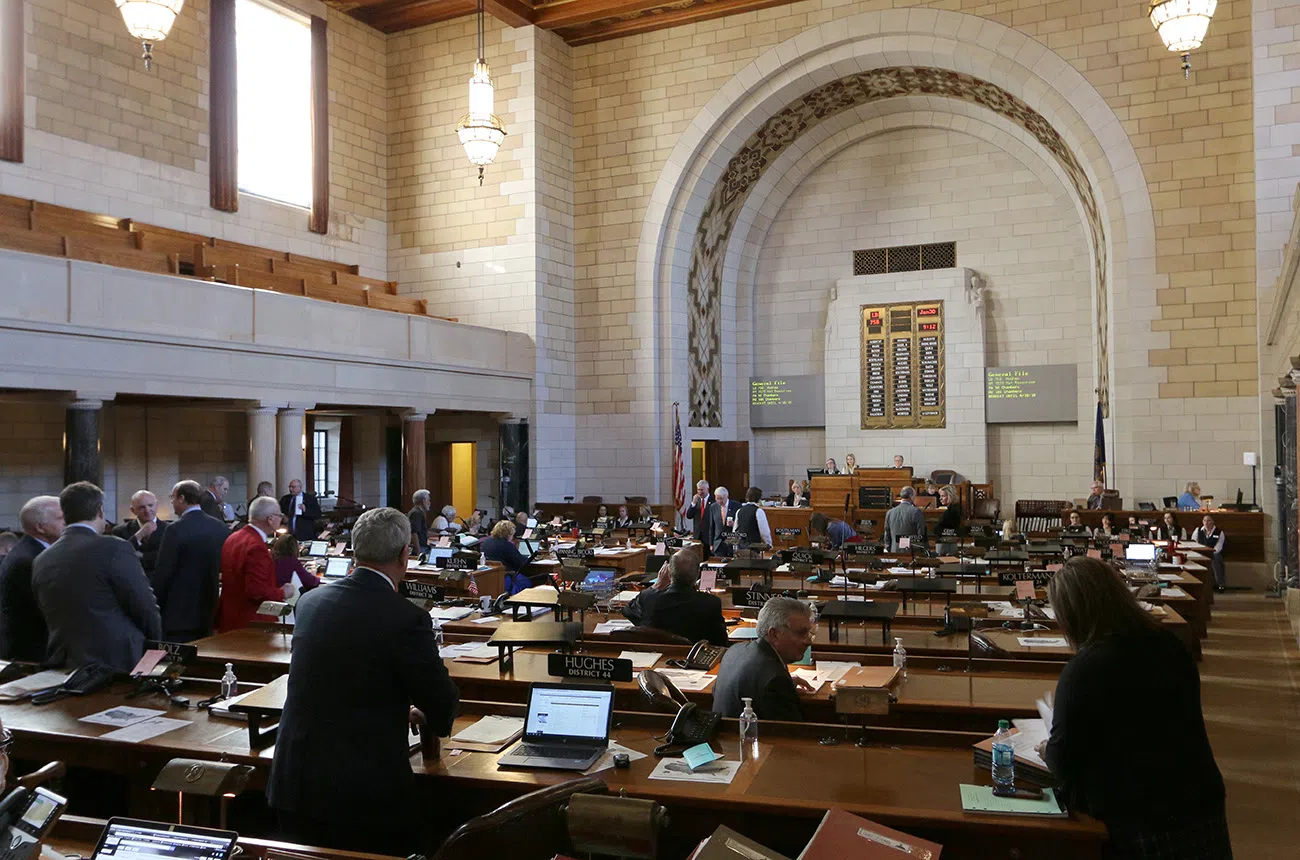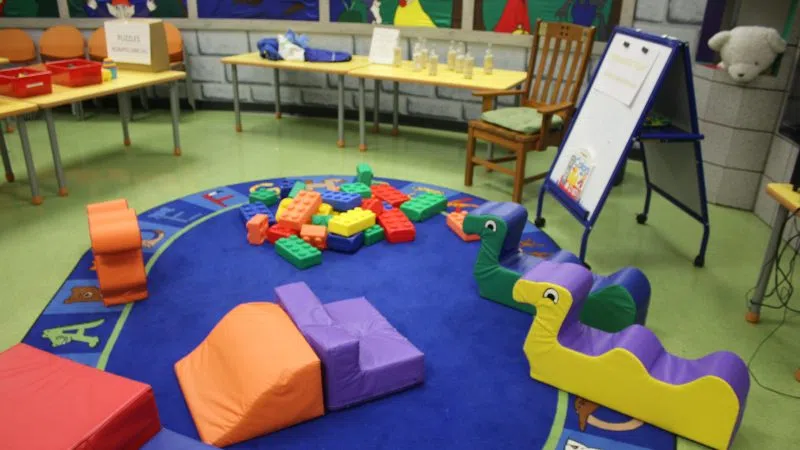
George W. Norris Legislative Chamber, (Nebraska Legislature, Courtesy)
LINCOLN — State lawmakers will be back in Lincoln this Wednesday, Jan. 8, for day-one of the 2025 legislative session — the 1st regular session of Nebraska’s 109th Legislature.
Being an odd-numbered year, Senators will be hunkered down in the State Capitol for 90-days until the session adjourns ‘sine die‘ on June 9th. Even numbered years, such as 2024, last only 60-days.
Nebraska’s unique one-house legislature was not immune from the political shake-ups of last year. 15 lawmakers were bounced from the Unicameral after serving 8-years, due to term limits approved by voters in 2000. Two senators, Ray Aguilar of Grand Island and Jan Day of Omaha, did not win reelection. Eight senators did win reelection.
This means 17 (about ⅓) of Nebraska’s 49-seat lawmaking body will be fresh faces — most making their legislative debut. Despite this turnover, the state’s technically non-partisan legislature will maintain roughly the same political-power balance as the 2023-24 class.
Republicans, or conservative lawmakers, held onto their exact super-majority control of the body with 33-seats, while Democrats, progressives if you like, kept hold of the remaining 16.
Navigating those political waters is only one part of the steep learning curve faced by new senators, according to Sen. John Arch of La Vista, speaker of the Nebraska’s 108th Legislature.
“They have to learn the process. They have to learn the policies. They have to form relationships,” Arch described. “The Clerk of the Legislature (Brandon Metzler) has run orientation. He had sessions for the new senators, the new the speaker will also have orientation for new senators. We have to be very purposeful in helping them get up-to-speed at the beginning, and being there for them as they have questions.”
Arch told KLIN News he will be running for the role of speaker again this year.
Returning senators, on the other hand, will face a more personal challenge.
“The challenging part with term limits, when you’re turning over approximately ⅓ of the legislature every two years, is the relationships that are necessary to be an effective legislator and the disruption of those relationships,” he said. “Our past relationships were formed. We knew how to work with each other. That is extremely important to the processing of bills and to the negotiation of those bills. So from those who are returning, now we have to make a very determined investment in building relationships with the new senators. That is part of what happened at a Legislative Council meeting recently held in Kearney. That’s happening over coffee. Everybody is reaching out to each other just to start that process because once the legislature starts and bills start flowing, there’s not a lot of time to build those personal connections.”
Despite the challenges associated with term limits, “there is an upside,” Arch said.
“That is new ideas, fresh energy, a willingness to take a look at the hard, complex subjects that past senators have tried to solve over the years. There is an advantage to that, there is excitement, and there is a sense of new energy that comes with it.”
The interim period between 2024’s session and now was not idly spent. Departing senators were treated to a final legislative send off by Gov. Jim Pillen, who called lawmakers back to Lincoln in late July for a 2-week special session focused on property tax reform. Arch says the interim period is typically utilized by senators as an opportunity to study policy issues. While the special session delayed some of those studies, Arch many senators spent their time wisely.
Arch shared the content of his interim study, identified as Legislative Resolution (LR) 298, which would “consider the restructuring of legislative oversight, over the issues concerning the executive branch and the judicial branch.”
“We’ve got two jobs in the legislature, one is to legislate and one is to appropriate. We need information from the other, co-equal branches of government, so that we can do our job well. In 2023, there was an Attorney General opinion that said our current legislative oversight structure would be considered unconstitutional. We’ve taken our time now to redesign a proposed structure for our legislative oversight to make sure that we’re able to do the best job we possibly can with our two functions.”
Arch presented this resolution to all senators, new and returning, during the recent Legislative Council meeting in Kearney.
“I think (the reaction) was overall positive. I think that there may be some senators that think we need to go further, and others that perhaps don’t see the significance of the need for that oversight,” Arch said. “But the overall sense is that the legislature must have a solid structure for providing oversight… The proposal is that we have an oversight committee that oversees an oversight division, and these functions then coordinate within that division. I think that in the future there might be some other oversight functions that would be added on and this would provide the structure for future legislatures to do that.”
Aside from oversight, Arch says the #1 issue that may dominate the legislature this year will be the budget and, namely, addressing a forecasted $400 million shortfall.
“As we did our tax reductions over the last couple years, it has all been based on forecasting and estimates. We are going to start seeing the actual impact of those now, beginning in this biennium,” he detailed. “We are going to understand what the actual impact is, then we will have to make adjustments and make sure the budget is balanced, which is our constitutional requirement.”
Crafting the budget this year will be a bit different than recent years, Arch said.
“The years after COVID, there was so much federal money and opportunity to invest in infrastructure, but that money is gone. Now we are back to, what I would call, a much more normal year where we now are required to balance our budget and set priorities. As a result of that, I think there’s probably going to be fewer requests for new programs and expansion of programs… It will be a year of digesting, in particular, those tax reductions that we’ve passed in the last couple years.”
During the 2023 legislative session, lawmakers approved a $6.4 billion tax relief package, featuring income tax cuts, hikes in state property tax credits, a tax credit for child care and a boost to school funding to offset property taxes.
Lastly, Arch said 2025 will bring a new opportunity for the public to stay involved and follow the work of the legislature through a new state-run video archive of Nebraska legislative floor debates and committee hearings.
“You could always read the transcript, but words alone don’t communicate everything. When you see tone, inflection, body language, and responses from senators during debate or in a committee hearing, you get a much better idea as to the process and how the senators are viewing the policy that’s being debated,” he said.
Nebraska’s 109th Legislature kicks off with day-one on Jan. 8, at 10 a.m.
The public can watch online via nebraskapublicmedia.org.














